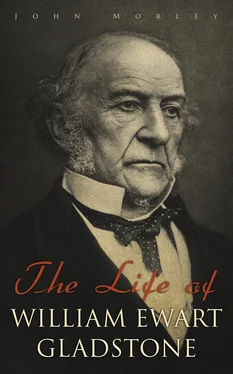( 1809-1821 )
I know not why commerce in England should not have its old families, rejoicing to be connected with commerce from generation to generation. It has been so in other countries; I trust it will be so in this country.—Gladstone.
The dawn of the life of the great and famous man who is our subject in these memoirs has been depicted with homely simplicity by his own hand. With this fragment of a record it is perhaps best for me to begin our journey. 'I was born,' he says, 'on December 29, 1809,' at 62 Rodney Street, Liverpool. 'I was baptized, I believe, in the parish church of St. Peter. My godmother was my elder sister Anne, then just seven years old, who died a perfect saint in the beginning of the year 1829. In her later years she lived in close relations with me, and I must have been much worse but for her. Of my godfathers, one was a Scotch episcopalian, Mr. Fraser of ——, whom I hardly ever saw or heard of; the other a presbyterian, Mr. G. Grant, a junior partner of my father's.' The child was named William Ewart, after his father's friend, an immigrant Scot and a merchant like himself, and father of a younger William Ewart, who became member for Liverpool, and did good public service in parliament.
Before proceeding to the period of my childhood, properly so-called, I will here insert a few words about my family. My maternal grandfather was known as Provost Robertson of Dingwall, a man held, I believe, in the highest respect. His wife was a Mackenzie of [Coul]. His circumstances must have been good.
Of his three sons, one went into the army, and I recollect him as Captain Robertson (I have a seal which he gave me, a three-sided cairngorm. Cost him 7½ guineas). The other two took mercantile positions. When my parents made a Scotch tour in 1820-21 with, I think, their four sons, the freedom of Dingwall was presented to us all, 1with my father; and there was large visiting at the houses of the Ross-shire gentry. I think the line of my grandmother was stoutly episcopalian and Jacobite; but, coming outside the western highlands, the first at least was soon rubbed down. The provost, I think, came from a younger branch of the Robertsons of Struan.
On my father's side the matter is more complex. The history of the family has been traced at the desire of my eldest brother and my own, by Sir William Fraser, the highest living authority. 2He has carried us up to a rather remote period, I think before Elizabeth, but has not yet been able to connect us with the earliest known holders of the name, which with the aid of charter-chests he hopes to do. Some things are plain and not without interest. They were a race of borderers. There is still an old Gledstanes or Gladstone castle. They formed a family in Sweden in the seventeenth century. The explanation of this may have been that, when the union of the crowns led to the extinction of border fighting they took service like Sir Dugald Dalgetty under Gustavus Adolphus, and in this case passed from service to settlement. I have never heard of them in Scotland until after the Restoration, otherwise than as persons of family. At that period there are traces of their having been fined by public authority, but not for any ordinary criminal offence. From this time forward I find no trace of their gentility. During the eighteenth century they are, I think, principally traced by a line of maltsters (no doubt a small business then) in Lanarkshire. Their names are recorded on tombstones in the churchyard of Biggar. I remember going as a child or boy to see the representative of that branch, either in 1820 or some years earlier, who was a small watchmaker in that town. He was of the same generation as my father, but came, I understood, from a senior brother of the family. I do not know whether his line is extinct. There also seem to be some stray Gladstones who are found at Yarmouth and in Yorkshire. 3
ANCESTRY
My father's father seems from his letters to have been an excellent man and a wise parent: his wife a woman of energy. There are pictures of them at Fasque, by Raeburn. He was a merchant, in Scotch phrase; that is to say, a shopkeeper dealing in corn and stores, and my father as a lad served in his shop. But he also sent a ship or ships to the Baltic; and I believe that my father, whose energy soon began to outtop that of all the very large family, went in one of these ships at a very early age as a supercargo, an appointment then, I think, common. But he soon quitted a nest too small to hold him. He was born in December 1764: and I have (at Hawarden) a reprint of the Liverpool Directory for 178-, in which his name appears as a partner in the firm of Messrs. Corrie, corn merchants.
Here his force soon began to be felt as a prominent and then a foremost member of the community. A liberal in the early period of the century, he drew to Mr. Canning, and brought that statesman as candidate to Liverpool in 1812, by personally offering to guarantee his expenses at a time when, though prosperous, he could hardly have been a rich man. His services to the town were testified by gifts of plate, now in the possession of the elder lines of his descendants, and by a remarkable subscription of six thousand pounds raised to enable him to contest the borough of Lancaster, for which he sat in the parliament of 1818.
At his demise, in December 1851, the value of his estate was, I think, near £600,000. My father was a successful merchant, but considering his long life and means of accumulation, the result represents a success secondary in comparison with that of others whom in native talent and energy he much surpassed. It was a large and strong nature, simple though hasty, profoundly affectionate and capable of the highest devotion in the lines of duty and of love. I think that his intellect was a little intemperate, though not his character. In his old age, spent mainly in retirement, he was our constant [centre of] social and domestic life. My mother, a beautiful and admirable woman, failed in health and left him a widower in 1835, when she was 62.
He then turns to the records of his own childhood, a period that he regarded as closing in September 1821, when he was sent to Eton. He begins with one or two juvenile performances, in no way differing from those of any other infant,— navita projectus humi , the mariner flung by force of the waves naked and helpless ashore. He believes that he was strong and healthy, and came well through his childish ailments.
My next recollection belongs to the period of Mr. Canning's first election for Liverpool, in the month of October of the year 1812. Much entertaining went on in my father's house, where Mr. Canning himself was a guest; and on a day of a great dinner I was taken down to the dining room. I was set upon one of the chairs, standing, and directed to say to the company 'Ladies and gentlemen.'
I have, thirdly, a group of recollections which refer to Scotland. Thither my father and mother took me on a journey which they made, I think, in a post-chaise to Edinburgh and Glasgow as its principal points. At Edinburgh our sojourn was in the Royal Hotel, Princes Street. I well remember the rattling of the windows when the castle guns were fired on some great occasion, probably the abdication of Napoleon, for the date of the journey was, I think, the spring of 1814.
EARLY RECOLLECTIONS
In this journey the situation of Sanquhar, in a close Dumfriesshire valley, impressed itself on my recollection. I never saw Sanquhar again until in the autumn of 1863 (as I believe). As I was whirled along the Glasgow and South-Western railway I witnessed just beneath me lines of building in just such a valley, and said that must be Sanquhar, which it was. My local memory has always been good and very impressible by scenery. I seem to myself never to have forgotten a scene.
Читать дальше









![William Frith - John Leech, His Life and Work. Vol. 1 [of 2]](/books/747171/william-frith-john-leech-his-life-and-work-vol-thumb.webp)


![William Frith - John Leech, His Life and Work, Vol. 2 [of 2]](/books/748201/william-frith-john-leech-his-life-and-work-vol-thumb.webp)